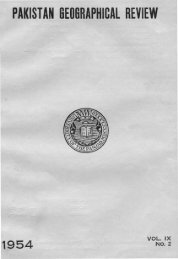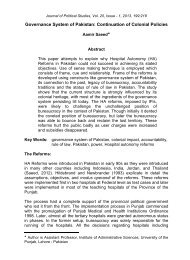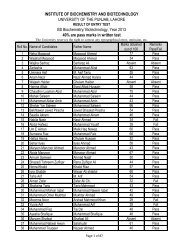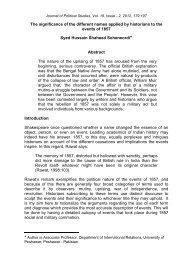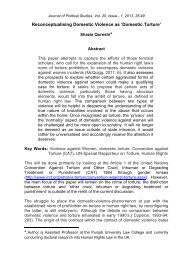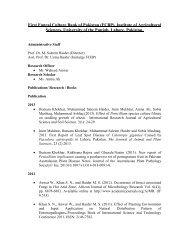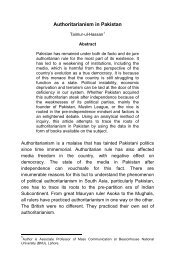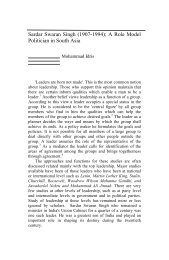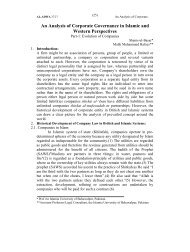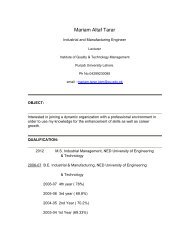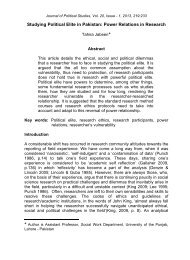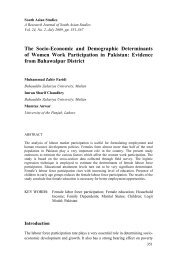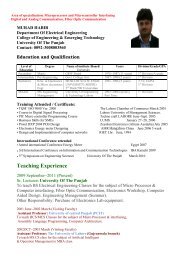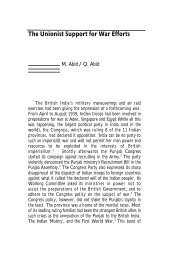Can Pakistan be a Secular State? - University of the Punjab
Can Pakistan be a Secular State? - University of the Punjab
Can Pakistan be a Secular State? - University of the Punjab
You also want an ePaper? Increase the reach of your titles
YUMPU automatically turns print PDFs into web optimized ePapers that Google loves.
Muhammad Imtiaz Zafar<br />
<strong>Can</strong> <strong>Pakistan</strong> <strong>be</strong><br />
universe. Mono<strong>the</strong>ism was a potent, creative cultural force, but its impact on<br />
religious consciousness was two-sided. The sublime religiosity it produced,<br />
enriched first Hebrew and later Christian consciousness; but by setting up a<br />
dichotomy <strong>be</strong>tween sacred and pr<strong>of</strong>ane aspects <strong>of</strong> reality it established an<br />
intellectual frame work within which secularization was almost bound to occur. A<br />
dialectical tension <strong>be</strong>tween religious and secular modes <strong>of</strong> thought <strong>be</strong>came a<br />
fundamental principle <strong>of</strong> Judaism and, through it, <strong>of</strong> Christianity. For, in<br />
discovering <strong>the</strong> transcendent majesty <strong>of</strong> Yahweh – in accepting Him alone as truly<br />
divine – <strong>the</strong> Hebrews gained <strong>the</strong> power gradually to extricate <strong>the</strong>mselves from <strong>the</strong><br />
hegemony <strong>of</strong> ‘false gods’ and <strong>the</strong> mystification <strong>of</strong> paganism. The natural world, a<br />
product <strong>of</strong> divine creativity but not itself divine could now <strong>be</strong> regarded in<br />
mundane, matter-<strong>of</strong>-facts terms” (Gil<strong>be</strong>rt A. 1980: 17-18).<br />
Akin to that is <strong>the</strong> concept <strong>of</strong> <strong>the</strong> Papal infallibility, an evidence <strong>of</strong><br />
desacralization <strong>of</strong> divinity and transferring it to man. It started from <strong>the</strong> Apostle<br />
Peter, who was accorded both by Jesus and <strong>the</strong> early church a position <strong>of</strong><br />
exceptional authority. When pope, particularly in Catholic dogma, as <strong>the</strong> successor<br />
<strong>of</strong> Peter speaks ex ca<strong>the</strong>dra, he possesses <strong>the</strong> infallibility that Christ <strong>be</strong>stowed<br />
upon his church. In reality, papal infallibility remains a subject about which <strong>the</strong>re<br />
is no Christian consensus. This article <strong>of</strong> Christian <strong>the</strong>ological faith is hardly<br />
proved to <strong>be</strong> found in <strong>the</strong> very foundation <strong>of</strong> <strong>the</strong> Holy See in Peter’s life. J.M.R.<br />
Tillard writes that a serious study <strong>of</strong> <strong>the</strong> New Testament thus shows Peter as<br />
formally commissioned by Christ to take <strong>the</strong> lead when fundamental issues<br />
concerning <strong>the</strong> church are at stake. But this commission is always inseparable<br />
from that <strong>of</strong> <strong>the</strong> whole group <strong>of</strong> apostles or disciples. It is also inseparable from<br />
repeated insistence on Peter’s personal weakness, his enduring fallibility, and his<br />
capacity actually to provide false witness. Even nothing is explicitly said, in <strong>the</strong><br />
New Testament, <strong>of</strong> a journey <strong>of</strong> Peter to Rome and his martyrdom in this city. But<br />
<strong>the</strong>re is, both in <strong>the</strong> earliest tradition and in archaeological evidence,<br />
overwhelming support for his presence and death <strong>the</strong>re. The crucial question<br />
remains: was Peter supposed to have a successor? Here again <strong>the</strong> New Testament<br />
is silent (Tillard 2000). The doctrine <strong>of</strong> papal infallibility was first developed by<br />
Franciscan <strong>the</strong>ologians in <strong>the</strong> early fourteenth century. Held by some <strong>the</strong>ologians,<br />
rejected by o<strong>the</strong>rs, it <strong>be</strong>came <strong>the</strong> touchstone <strong>of</strong> ultramontanism (Paul A. 2000).<br />
Apart from <strong>the</strong> controversy <strong>of</strong> <strong>the</strong> person <strong>of</strong> Peter and his infallibility, <strong>the</strong> crux <strong>of</strong><br />
<strong>the</strong> matter is that <strong>the</strong> whole paradigm <strong>of</strong> Catholic <strong>the</strong>ology establishes<br />
desacralization <strong>of</strong> <strong>the</strong> divinity to man, after all Peter was a human <strong>be</strong>ing not God.<br />
Protestant’s position on <strong>the</strong> subject <strong>of</strong> <strong>the</strong> process <strong>of</strong> secularization is not<br />
entirely different. Fundamentals <strong>of</strong> Protestant religion seem to <strong>be</strong> standing on<br />
secular foundations. Godly authority <strong>of</strong> man’s salvation endowed to pope and<br />
priest as deputies <strong>of</strong> God in <strong>the</strong> Catholic faith, was rejected by Martin Lu<strong>the</strong>r. He<br />
said if mastery <strong>of</strong> <strong>the</strong> Scriptures could <strong>be</strong>stow on <strong>the</strong> pope a position to issue a<br />
decree on ordinary Christian’s destiny <strong>the</strong>n qualifies him to seek expiation himself<br />
from his sins through Scriptures. He translated <strong>the</strong> Bible into <strong>the</strong> German language<br />
173



